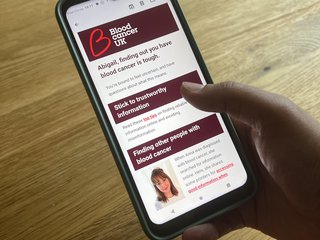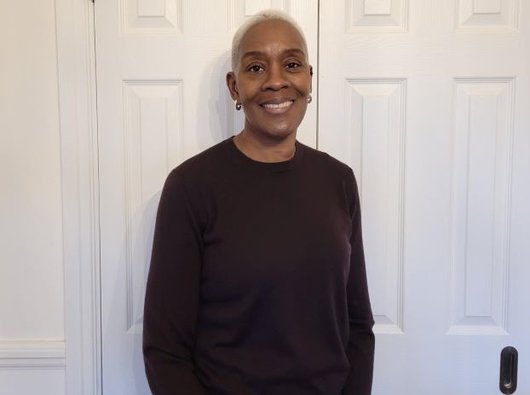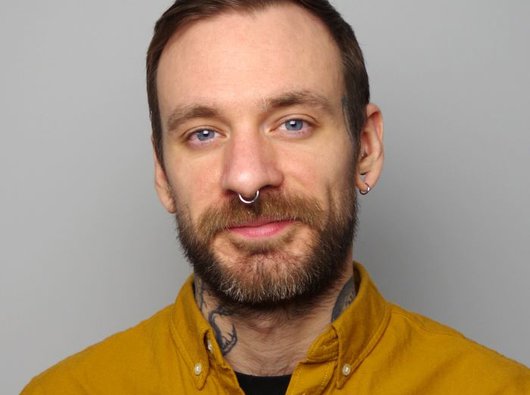Acute myeloid leukaemia (AML) practical support
An AML diagnosis has a big effect on you, and those close to you. But there is lots of information and support out there.
It’s really important that both you, and your family and friends, get the support you need.
For you, this will help you get through treatment and the day-to-day. For your family, it will help them cope with what's happening.
Support if you've been diagnosed with AML
When you are first diagnosed with AML, you might simply feel shocked or stunned.
Many people describe staying strong for their family or not wanting to break down. But most people also feel scared, lonely or isolated at other times.
We are here if you want to talk or have any questions or worries:
- Contact our Support Service and tell us you’ve been diagnosed with AML. We can talk you through what to expect and help you think of questions to ask your medical team.
- Read success stories - there are lots of people who have recovered from AML.
- Talk to other people with AML who’ve been where you are.
- Order this guide to AML, a booklet about diagnosis, treatment, and other people’s experiences of AML.
- Order this booklet for people newly diagnosed, which covers the key things to know, and how you can help yourself.

Get a weekly support email from us
We'll send you clear and simple information, practical tips, and advice from other people with blood cancer, to help during the first few weeks and months after diagnosis.
Support for family and friends
If someone you love has been diagnosed with blood cancer, we are here for you too.
You might be dealing with difficult emotions of fear, isolation or being powerless. You might also be managing lots of practical things at home.
Come to us for the support you need:
- Contact our Support Service and tell us what’s happening.
- Read success stories - there are lots of people who have recovered from AML.
- Talk to other families and friends facing AML – sometimes the best support comes from other people in similar situations.
- Order free copies of this guide about AML, a booklet about diagnosis, treatment, and other people’s experiences of AML.
- Find more information online for family and friends of people diagnosed with blood cancer.
Support for children
If you have children in your family, you might be very worried about how they will cope with the AML.
Children will normally know that something is wrong, and their fear can be worse if they don't know what's happening.
It's important that children know they can ask questions and talk about the illness. You can help them by starting the conversation or asking them a question.
Telling children what to expect also helps them manage. For example, tell them if your hair will fall out, or tell them the plan if different people will be looking after them at times.
Your nurse or doctor can be a great source of advice on how you can support children through this. They might even be able to talk to children with you, explain things and answer their questions.
It's a good idea to tell their school what's happening too, so that teachers can keep an eye on how they are.
Of course it's still important for children to have fun, to do some of their normal activities, and have family time.
If one parent is in hospital, it's important that children can still do fun activities with their other parent or other family members or friends, even if it's just a movie night at home.
Try not to hold back your emotions in front of children all the time. Getting upset in front of them shows that they are allowed to get upset too, and it's not something they have to hide. When a parent is ill, it's always difficult for children, but they will remember that you were honest and open with them.
We often talk to people on our support line about telling people your diagnosis and dealing with different reactions. Contact our Support Service and we can help you prepare for talking to your children.
You can also talk to other parents and guardians about how they’ve supported children in this situation on our online community forum.
"Seeking support in the patient community lets me share all my worries and realise I’m not alone in them.
It's a place to be honest and share the realities of AML."
Yvonne, diagnosed with AML in 2018.
Read Yvonne's story about finding people who understand what you've been through.

What can I do to help myself?
Looking after your physical and mental health is important and will help with your recovery.
Here are some tips from other people who’ve been through AML:
- Take things one day at a time – Focussing just on today, rather than thinking about the future, can help you get through treatment.
- Celebrate small wins – AML can bring lots of ups and downs, and focussing on the ups, however small, can help you keep a positive mindset.
- Have a goal or focus – This could be a mini goal just for today, something you want to do after treatment, or simply having a photograph of someone special to look at – find something that can motivate you through this.
- Try to keep moving – Being physically active improves your strength and your mood. Even just walking around the house or standing up regularly in your hospital room will help.
- Talk to someone – Contact our Support Service and talk to us – we are here to talk about anything that's bothering you, even if you just want a chat.
For lots more tips and stories from people with blood cancer, see our information on mind and emotions, keeping active and eating well.
"Before I got the support I was looking for, I felt I was almost living a double life. One as part of the queer community and one as part of the cancer community.
But neither seemed to fully understand the intersectionality of these two parts of me."
Stewart, diagnosed with blood cancer in 2016.
Read Stewart's story about seeking support as a queer person with blood cancer.

Work, money, childcare and help at home
Here are some key things to know if AML is affecting your daily life.
- If you are working when you are diagnosed with AML, you have rights. Cancer is classed as a disability by the law, so you are protected against discrimination. Find out more about working with blood cancer and problems at work.
- There is financial support available – you may be eligible for financial benefits and support after being diagnosed with cancer. Anyone looking after you at home might also be eligible.
- You might be able to get help with the cost of travelling to hospital or parking. Ask your medical team or ward reception.
- If there are children you normally look after, getting help from family and friends is often the best option. Children usually adapt well to this and learn what it means to be a family or community. If you can’t do this, there are charities and organisations that can help, like Carer’s Trust and HomeStart.
- Making your life easier at home can benefit you and anyone else you live with, so you can focus on getting better. You might be able to get help from a professional carer, day care for children, help with housework or financial support. Contact your local council.
To find out how to access any of this support, and for many more practical tips, see our information on money and work.

Talk to other people affected by blood cancer
Hear from and connect with people who understand.
